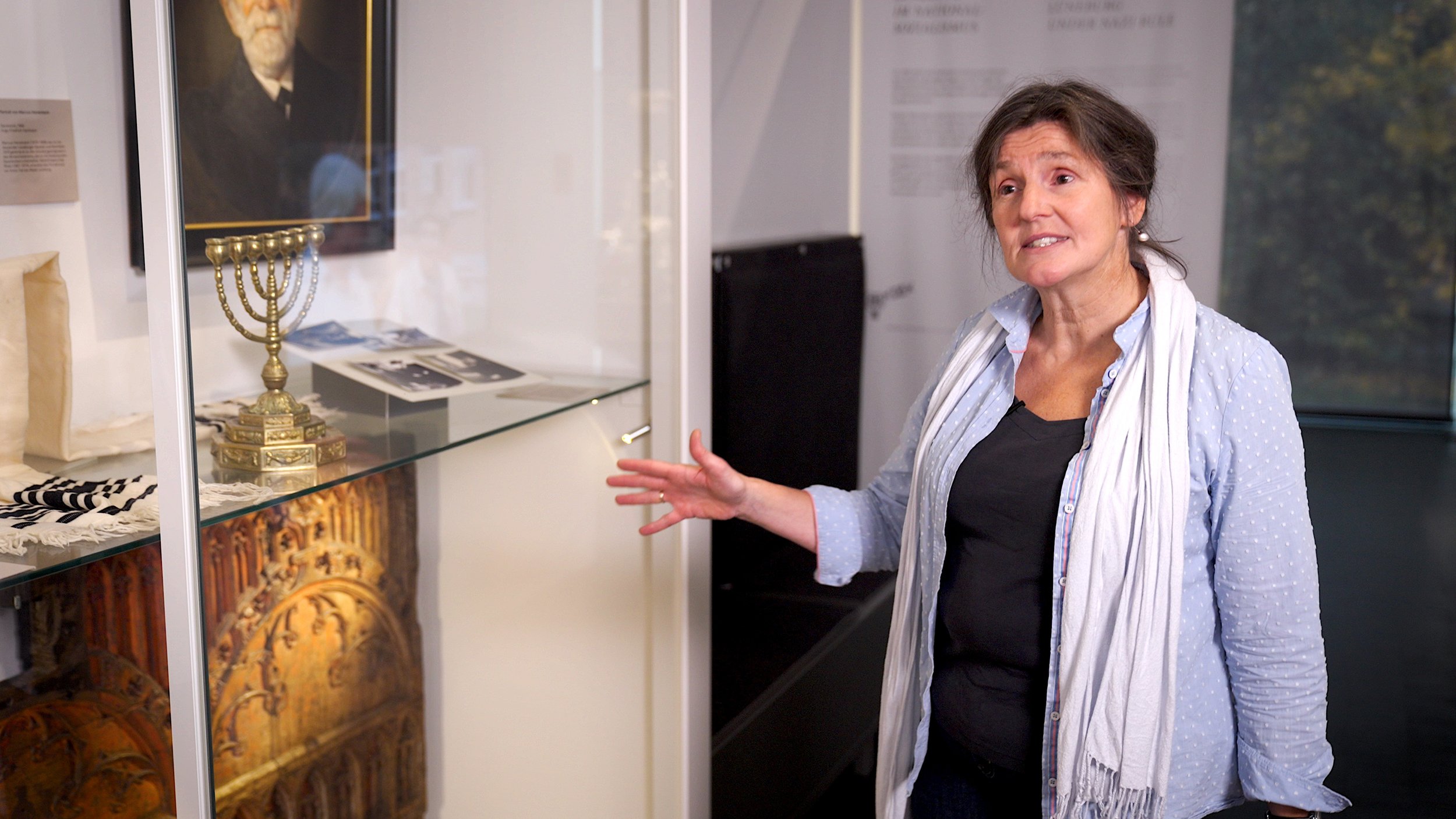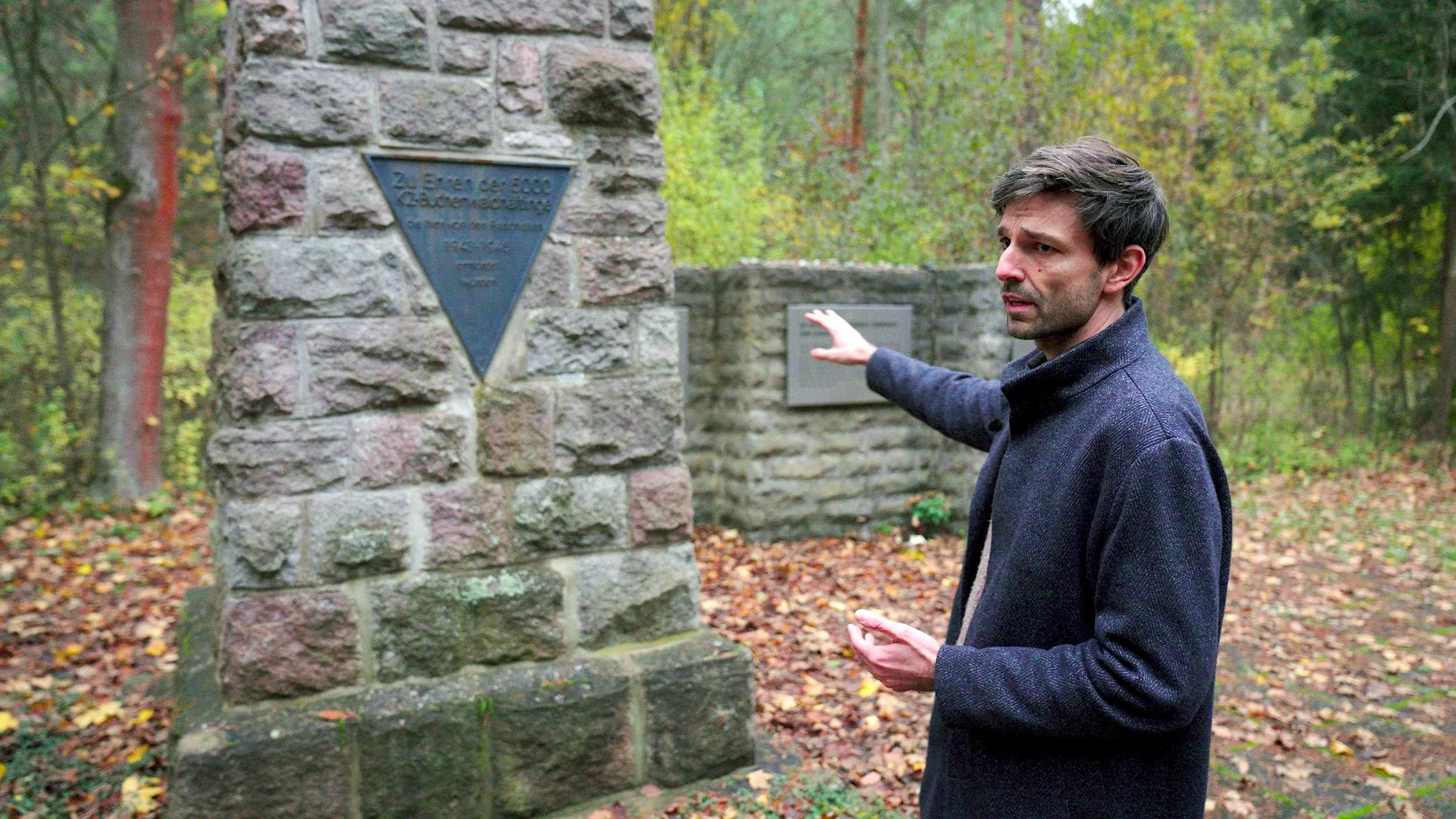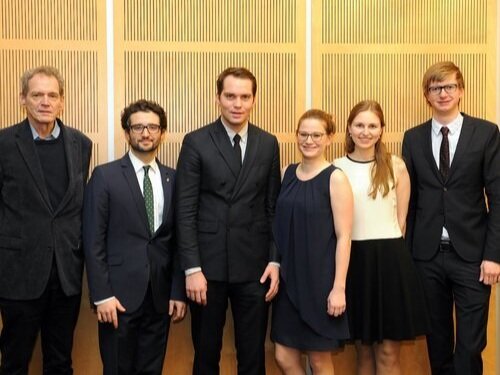2024 Obermayer Award Recipients Announced
Winners use the lessons of history to fight prejudice and raise awareness of local Jewish history
Germans who do exceptional work to keep alive the memory of Jewish communities destroyed by the Nazis and use local history to fight antisemitism and other forms of bigotry will receive the 2024 Obermayer Awards. The awards will be presented on January 29, 2024 at the Rotes Rathaus in a ceremony hosted by the Governing Mayor of Berlin, Kai Wegner, and the President of the Berlin Parliament, Cornelia Seibeld. The annual ceremony has taken place for more than two decades, and is a prominent official highlight of the observance of international Holocaust Remembrance Day in Germany’s capital.
The ceremony will be held in person and also livestreamed on the websites of the Berlin Parliament and Widen the Circle at 18:30 CET/12:30 EST on January 29, 2024.
The Obermayer Awards, organized and administered by Widen the Circle, honor German individuals and groups that have illuminated the vital role Jews played in German society for hundreds of years before the Nazi era. The awards also honor those who use the lessons of history to fight against modern-day prejudice and racism (including antisemitism), and who foster the kind of understanding among different groups that prevents prejudice from taking root.
“At a moment when there is an alarming rise of antisemitism and other forms of prejudice and hatred around the world, this year’s Obermayer Award winners set a global example that should inspire everyone who is striving to overcome racism and bigotry,” said Joel Obermayer, Executive Director of Widen the Circle.
The 2024 Obermayer Award Winners
Dirk Erkelenz
Dirk Erkelenz (Cologne, North Rhine-Westphalia): This teacher changed the culture of his high school in Cologne by encouraging and training students to do research that commemorates Jews who attended the school and were victims of the Nazis. More than 150 students have been involved in this project since 2015. Their work of active remembrance has included tracking down, contacting, and developing relationships with descendants of the Jewish students who have been the focus of their research. As a result, many of these descendants have visited Cologne to learn more about their German ancestors and attend commemorative events Mr. Erkelenz has helped to organize, including the installation of Stolpersteine (stumbling stones). He has also coedited a book that incorporated his students’ research.
Anneke de Rudder
Anneke de Rudder (Bad Bevensen, Lower Saxony): A provenance researcher and historian now based at the Hamburg State and University Library, she has done exhaustive research on the lives of Jews in the Lower Saxony town of Lüneburg and elsewhere for many years. She has focused on researching objects looted by the Nazis, finding and contacting the rightful owners or their heirs. Many of these descendants have come to Germany, and she has introduced them to their ancestors’ hometowns and built connections between them and contemporary Germans. For example, at the request of the Lüneburg Museum, she led efforts to find almost 60 heirs of a once-prominent Jewish citizen of Lüneburg, Marcus Heinemann, and helped organize a restitution ceremony attended by several dozen descendants. She is also developing a digital database of Lüneburg’s Jewish famlies, featuring names, dates, stories, and photographs. It will serve as a resource for descendants, local residents, and researchers worldwide.
Marie Rolshoven
Marie Rolshoven (Berlin): She and her late mother initiated a program that encourages Germans to research the lives of people who once lived in their homes — Jews and others persecuted during the Nazi period or members of the resistance — and then share what they have learned. One weekend a year, these homes are opened and the public is invited to hear personal stories of the former residents, often told in collaboration with Jewish descendants. The program, called "Denk Mal am Ort,” (DMAO, a play on words meaning “Think About This Place” or “Memorial on Site”), is patterned after a successful Dutch memorial program. DMAO also includes walking tours, exhibitions, and live music. The program started in Berlin in 2016 and has expanded to include 50 sites in Berlin, Munich, Frankfurt, and Hamburg, with more than 2,000 participants. Some international descendants return every year to participate in the program.
Christoph Mauny
Christoph Mauny (Weimar, Thuringia): He has helped create a range of innovative remembrance projects, many of them using new media and involving the active participation of young people. The projects focus mainly on the towns of Gotha and Ohrdruf, both in a region where the far right has growing influence, and on the subcamp system of the Buchenwald concentration camp. In one project, a 360-degree video of the synagogue in Gotha was projected at the site of its destruction by the Nazis. The video and media art installation was shared on YouTube and can be used as a virtual reality presentation. Another central project, Deutsche Erinnerungslücke KZ Ohrdruf (German Memory Gap Ohrdruf), is designed to run until the year 2100. Participants including youth, artists, witnesses, and experts will digitize names, compile biographies, and create objects and sketches for an ongoing "unfinished memorial.” It seeks to address the questions of what we want to remember and why; how we can remember appropriately; and how we want to live as a society. With these and other projects, Mr. Mauny has empowered young people to take a stand against antisemitism and the far-right.
Margit Sachse
Margit Sachse (Rossdorf, Hesse): This history teacher and biographer has inspired her students—and alumni—in Darmstadt to engage in local Jewish remembrance projects for more than a decade. Her ongoing project, “Students Against Forgetting and for Democracy,” has used innovative media presentations and students’ research on the lives of Darmstadt’s former Jewish residents to ensure that local jewish history is embedded in the school’s culture. Among other voluntary activities, she led efforts to support an ongoing and unique virtual reconstruction of the former Darmstadt synagogue. A permanently installed telescope serves as the portal to an educational app that makes the synagogue become visible in a unique way. More recently, she has built connections to encourage remembrance work in other parts of Europe. She has established partnerships with groups working with young people and artists in France, Greece, and other countries. She has also developed media presentations for on-site meetings she has organized and has encouraged the publication of students’ work.
EXIL e.V.
EXIL e.V. (Eberswalde, Brandenburg): In 1997, in a city where neo-Nazis were very visible and vocal, this organization was founded by courageous punk rockers who preserved two barracks of a former subcamp of the Ravensbrück concentration camp. Over the past 25 years, they have developed various ways to teach the history of the female forced laborers who had been imprisoned in the camp. At the same time, EXIL became a meeting place for music and cultural life and later for migrant children and youth programs. EXIL’s activities have also included remembrance work focusing on Jewish history in a nearby industrial site, as well as concerts to raise money for Amcha Germany, an organization that provides psychosocial support for Holocaust survivors. In 2003, the Exil members helped found Bürgerstiftung Barnim Uckermark (the Barnim Uckermark Community Foundation, named for the region where Eberswalde is located). The foundation is led by Kai Jahns, a cofounder of EXIL, and focuses on providing educational opportunities for young people, strengthening children’s rights, and creating sustainable social change.
A special Distinguished Service Award will be presented to:
Katharina Oguntoye
Katharina Oguntoye (Berlin): As a historian, author, and community leader since the 1980s, Ms. Oguntoye has helped foster among German mainstream society an awareness of Black Germans and recognition of the history and identity of Black Germans. Her groundbreaking books include Farbe bekennen (“Showing Our Colors,” coedited, 1986) and Eine afro-deutsche Geschichte (“An Afro-German History,” 1997). As a cofounder of the initiative Schwarze Menschen in Deutschland (Initiative of Black People in Germany) and ADEFRA – Schwarze Frauen in Deutschland (Black Women in Germany) as well as the intercultural association JOLIBA, she has been instrumental in promoting the development of the Afro-German community. With her help, social services have been created for Black people and their families in Germany, and her antiracism work and historical research have changed social perceptions. With her workshops, lectures. and cultural events, she has facilitated dialogue, debunked prejudices, and motivated countless people to become enthusiastic about intercultural coexistence.
"Ms. Oguntoye’s remembrance work is of the very highest caliber and fits with the spirit of the Obermayer Awards, although her focus is on a different group than German Jews," according to Mr. Obermayer. "The history of Black Germans, who were also persecuted by the Nazis, has largely been missing in German remembrance culture. By recognizing her, we hope to raise awareness of this history and help to move forward this area of remembrance.”
Widen the Circle works with people uncovering history related to oppression and who are using the lessons of that history to fight contemporary bigotry. Widen the Circle is active in two areas beyond the Obermayer Awards. The Widen the Circle Network consists of Obermayer Award winners and other remembrance activists across Germany working toward that goal. Widen the Circle’s International Bridge Building program brings together remembrance practitioners from the U.S. and Germany to share ideas and build connections in order to amplify their further work.
The Obermayer Awards were founded in 2000 by Dr. Arthur S. Obermayer (1931-2016), an American entrepreneur, activist, and philanthropist, and his wife, Dr. Judith Obermayer. The Awards are administered by Widen the Circle, with sponsorship and organization of the ceremony in Berlin by the Berlin Parliament. They are also cosponsored by the Leo Baeck Institute (New York). Visit WidentheCircle.org for information about the Awards and profiles of awardees from past years.
Media Contacts: Tatjana Kirchner (Germany) 030-8471-1812 kirchner@kirchner-pr.de
Dan Fleshler (U.S.) 646-552-1213 dfleshler@gmail.com
THIS WALL BRINGS PEOPLE TOGETHER
Students at this Berlin elementary school, built on the site of a synagogue, have been building a wall for the past two decades. It delivers a powerful message about community.
A NAZI LEGACY, A LIFE GIVING BACK
Hilde Schramm has spent her adult life fighting racism and intolerance. And she doesn’t shy from her family history as the daughter of an infamous Nazi leader.
STUDENTS REACHING STUDENTS
When a handful of ninth graders from Berlin met Rolf Joseph in 2003, they were inspired by his harrowing tales of surviving the Holocaust. So inspired that they wrote a popular book about his life. Today the Joseph Group helps students educate each other on Jewish history.











